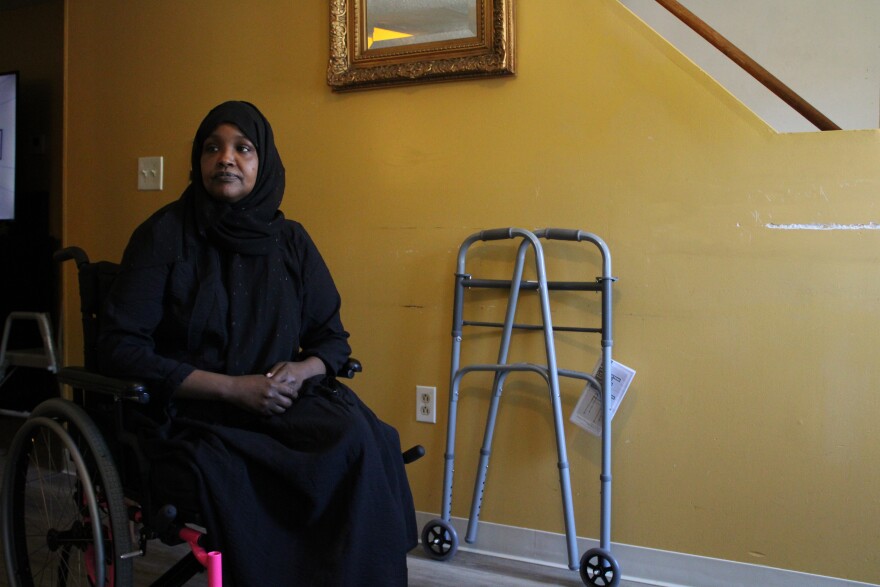On a recent morning, Fowsia Musse sat on a bed in the living room of her Auburn apartment.
A wheelchair was pulled up within arm's reach of the bed, and Musse said she’s learned to lift herself in and out of it on her own, as she adjusts to living without her right leg.
"I'm able to do a lot of basic stuff for myself right now," she said, adding that she's also relying on help from friends and family.
Musse’s ordeal began last October, with a trip to visit family in Ethiopia, the first time she'd been back in nearly 30 years. After a week in Addis Ababa visiting her mother, she and her 14-year-old son, Moby and eight-year-old daughter, Hawa, flew east, to the Somali region of Ethiopia, to visit other relatives. Musse’s sister, Juweria Subcis, a member of the regional parliament, met them at the airport when they landed.
As they were walking out, Musse said they encountered an armed guard, later identified by local media as a federal police officer. Musse asked the man if her son could pose for a photograph with him.
"And he just responded with so much aggression and so much like profanity, he's like, 'Get the hell out!'" Musse remembered.
Musse said her sister stepped in and had words with the officer, who suddenly raised his gun and fatally shot her. Then, he turned to Musse, and shot her in the stomach. At first, she said she didn't realize she had been hit.
"I'm still standing yelling at him, 'Oh my God, oh my God.' Then he loads again and he hit me in the right leg, twice. That's when I hit the ground," she said.
She said the officer shot her sister one more time, even as she lay motionless on the ground, before running off into another part of the airport, where he shot four more people, according to local news reports, before he was eventually apprehended.
Lying on the floor, Musse said she was losing a lot of blood and slipping in and out of consciousness. She took off her headscarf and tied it around her knee as a makeshift tourniquet, then reached over and pulled a baggage cart close to her so she could elevate her head.
"And I tried to slow down my my breathing. And I remember there was a little voice in the back of my head," she said, telling her, "'Don't sleep, don't fall asleep. Don't fall asleep. You're not going to die here today.'"
After some time, a group of men put her in the back of a pickup truck and drove her to a local hospital. She was eventually transferred to a Norwegian-run medical center that serves embassy staff and international organizations in the capital city.
That’s where Musse was told that her right leg needed to be amputated below the knee to save her from a potentially life-threatening infection.
"I did not even hesitate two seconds, I said, 'Nope, we're going to surgery. I'd rather lose one leg than to lose my whole life.' So I said, 'Let's go doctor,'" she remembered.
The next day, she had a second amputation, close to her hip.
Meanwhile, a GoFundMe campaign organized by one of Musse's daughters raised over $140,000 to pay for a medical evacuation flight to bring her home.
In mid-November Musse arrived back in the U.S., but her ordeal was far from over. At Maine Medical Center, doctors battled a severe bacterial infection that was resistant to drug treatment.
"They didn't think I was going to make it for the first two months, because I had a superbug bacteria unlike any other bacteria," she said. "All the doctors [had] to come together. I remember a doctor from the CDC and everyone [had] to come together and they made a special antibiotic for me."
In early February, nearly four months after she was injured, Musse came home to Auburn. Her two oldest daughters have moved back from college to help care for her. And the family is trying to find a new apartment that is wheelchair accessible.

Musse said she still hasn’t been able to fully process the emotional trauma.
"The image of the incident plays in my head, literally by the minute, minute after minute. And my brain is working on scenarios. What if, what if, what if. And I think the strongest feeling I'm having is the guilt," she said. "Why did I go? You know, like, I brought this to them, you know, and if I didn't go, she will be here."
Musse says she wants to honor her sister’s legacy by creating a foundation and shelter in her name to support women and homeless children in the Somali region of Ethiopia. It would be modeled after a nonprofit in Lewiston that Musse said she showed her sister when she visited Maine.
"You know, there's a lot of abandoned children. There's a lot of homeless kids. And so we talked about, you know, taking sewing machines donated from the United States and teaching poor, destitute women soft skills, and then giving them sewing machines so they can feed their children," she said. "So it will not be in vain."
Despite the horrific memories of the airport that was the scene of her sister's death, Musse said she wants to return there someday, to consecrate a memorial in her name.
Even as she struggles to process the trauma, Musse said she feels immense gratitude to the many people who helped get her home, including her family on both continents, hospital staff in Maine and Ethiopia, and friends and strangers alike who contributed to the medical evacuation fundraiser.
She said it's thanks to the help of a lot of people, and the grace of God, that she's now able to be home with her children.



